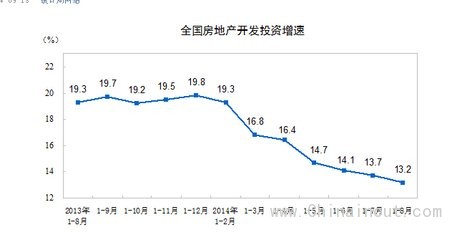8月份中國(guó)房?jī)r(jià)繼續(xù)下行

8月份全中國(guó)新公布的房?jī)r(jià)都出現(xiàn)了下跌,,表明中國(guó)房地產(chǎn)市場(chǎng)增長(zhǎng)嚴(yán)重放緩,。部分分析師表示,這次放緩是全球經(jīng)濟(jì)的最大威脅之一,。
根據(jù)中國(guó)國(guó)家統(tǒng)計(jì)局(National Bureau of Statistics)發(fā)布的數(shù)據(jù),,在被調(diào)查的70個(gè)城市中,8月份有68個(gè)城市的房?jī)r(jià)出現(xiàn)下跌,,其中包括北京,、上海和廣州等富裕城市。
相比之下,,7月份有64個(gè)城市的房?jī)r(jià)下跌,。
路透社(Reuters)從這些數(shù)據(jù)計(jì)算得出,8月份房?jī)r(jià)平均比7月份下跌1.1%,。
在多年投資驅(qū)動(dòng)的熱潮之后,,中國(guó)房地產(chǎn)市場(chǎng)的增長(zhǎng)正在放緩。這次下行導(dǎo)致煉鋼原料鐵礦石價(jià)格的下跌,,從而威脅到全球礦商的盈利,。不僅如此,樓市長(zhǎng)期低迷還可能加重中國(guó)各銀行及“影子”銀行的壓力,。所謂“影子”銀行是指信托公司之類不受監(jiān)管的金融機(jī)構(gòu),,這些信托公司會(huì)向包括房地產(chǎn)開發(fā)商在內(nèi)的高風(fēng)險(xiǎn)借款人發(fā)放貸款。
Beyondbrics特邀博主,、Orient Capital Research的安德魯•科利爾(Andrew Collier)8月份在分析信托貸款后曾寫道:“真正有問題的領(lǐng)域是房地產(chǎn),。根據(jù)我們?cè)缦葘?duì)信托公司章程的調(diào)查,逾90%的信托公司都投資于地方房地產(chǎn)及基建項(xiàng)目??紤]到這一點(diǎn),,房地產(chǎn)業(yè)成為第一波信托公司違約的主要發(fā)源地毫不讓人意外。”
科利爾補(bǔ)充說,,還有一個(gè)后續(xù)問題是信托貸款合同中“擔(dān)保人和質(zhì)押品構(gòu)成的網(wǎng)絡(luò)”,。他發(fā)現(xiàn)只有32%的信托貸款曾說服借款人,將土地作為無法還款時(shí)的抵押品,。
更多資訊請(qǐng)關(guān)注中國(guó)進(jìn)出網(wǎng)
China's property slump deepens as prices fall
New home prices fell across China in August, underscoring the severity of a property market slowdown that some analysts say presents one of the greatest threats to the global economy.
According to data from China's National Bureau of Statistics, new home prices declined in 68 of 70 cities surveyed in August, including the wealthy cities of Beijing, Shanghai and Guangzhou.
This compared to a price fall across 64 of the cities in July.
On average, prices fell 1.1 per cent in August from July, according to a Reuters calculation based on the data.
China's property market is slowing following a multi-year, investment driven boom. The downturn has not only threatened global miners' profits by contributing to a slump in the price of steelmaking material iron ore. A prolonged property slowdown may also exacerbate stress on Chinese banks and the unregulated "shadow" lenders, such as trust companies, which extend credit to higher-risk borrowers including real estate developers.
As Beyondbrics guest blogger Andrew Collier, of Orient Capital Research, wrote in August following his analysis of trust loans: “The real problem area is property. Given that over 90 per cent of Trusts are invested in local real estate and infrastructure projects (according to our earlier examination of Trust Prospectuses), it is not surprising that the dominant source of defaults in the first wave of Trusts has been in the property sector. ”
Mr Collier added a follow-on problem was the "web of guarantees and collateral" in trust loan contracts, having found that only 32 per cent of trust loans had persuaded borrowers to pledge land as security in cases wher they could not repay.
更多資訊請(qǐng)關(guān)注中國(guó)進(jìn)出網(wǎng)







